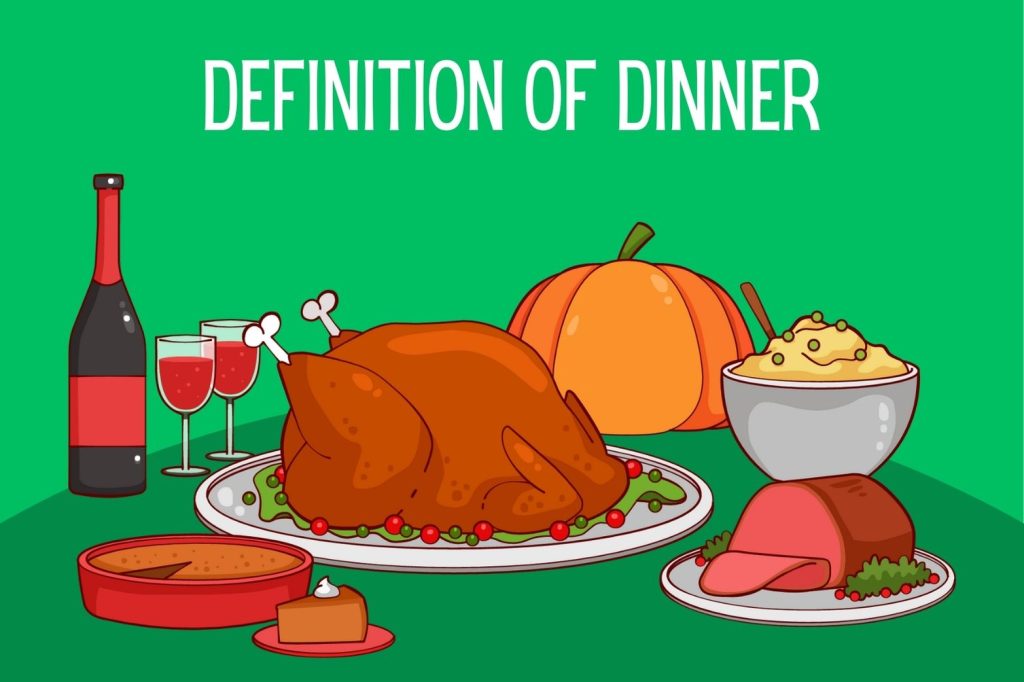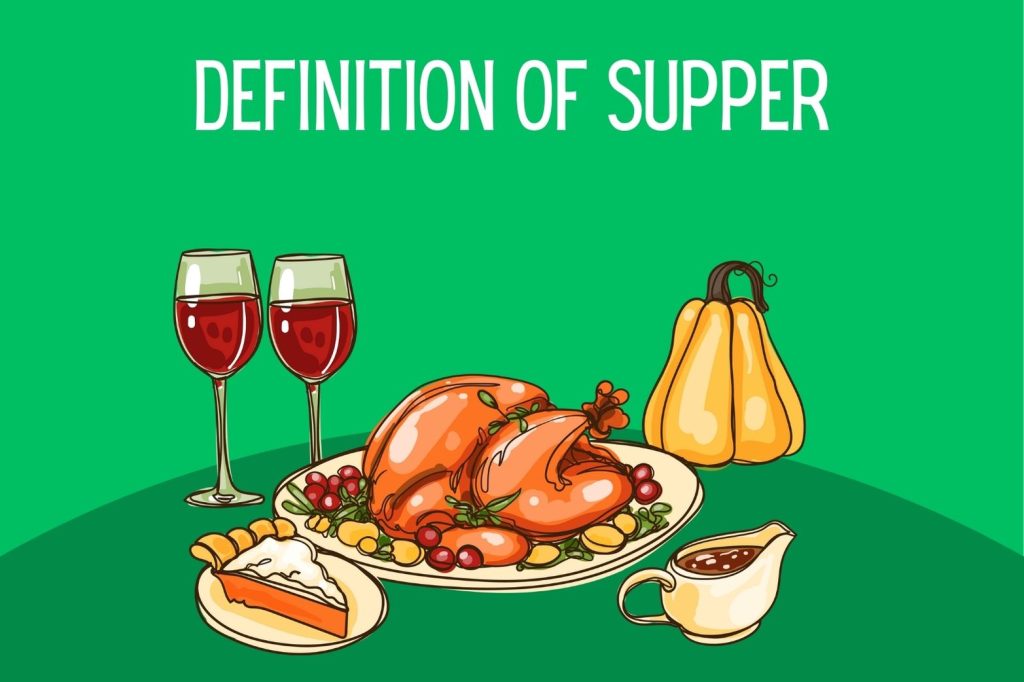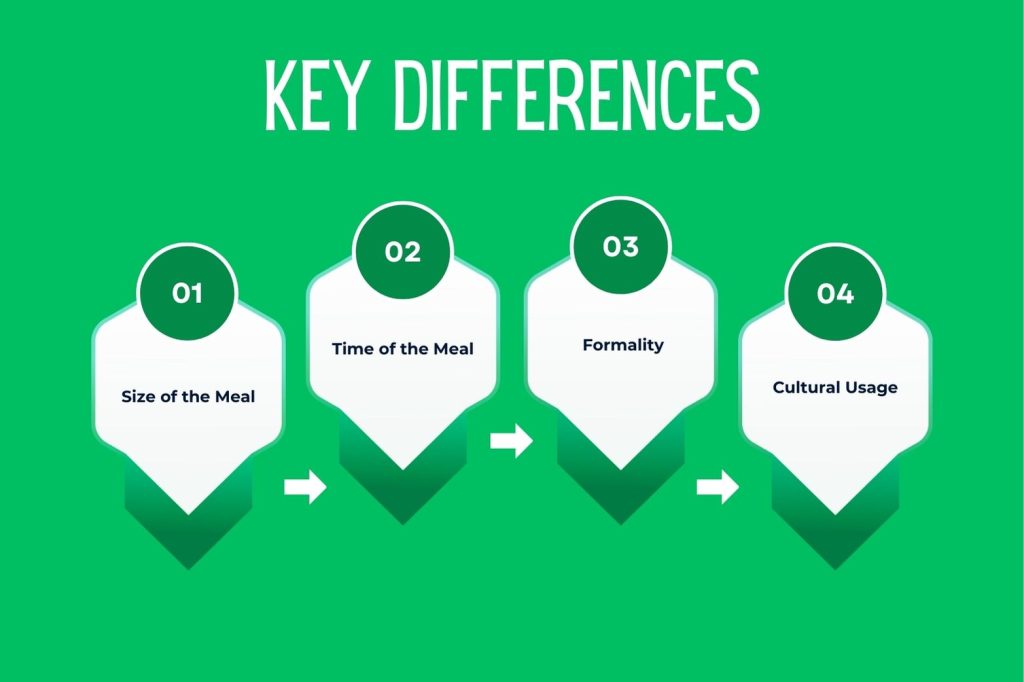Language is a product of many movers and shakers in the cultural world, with traditions and historical contexts being key.
Cultural differences raise some pricking questions. For example, supper and dinner refer to a meal, yet their usage differs from one area to another, in varying social settings, and under differing time frames.
Such variations assist in unpacking the dining etiquette associated with the related cultural nuances across the entire globe.
What follows is an extensive article elucidating the supper-dinner divide on different meanings, history, and regional variations; specific times in the evening; and social and cultural sketches of various traditions.
Supper vs. Dinner: the Difference?
Traditionally, supper and dinner are words using interchangeably in most cases. However, some differences in meaning and historical origin exist between the two, and some differences in meaning are often understood differently among various cultures.
Definition of Dinner

Dinner is understood widely to mean the principal meal of the day, which nowadays is mostly serving in the evening. The term dinner came from the Old French disner, that means “to dine”: to break a fast.
A diner denoted the largest meal of the day at midday. Yet, as lifestyles and work schedules changing, this dinner was moved later and later into the evening. Dinner today includes several courses, the number and style of which depend on the very occasion.
Definition of Supper

Supper is, generally speaking, as a lighter supposedly later evening meal, taken sometimes after or instead of dinner. The word has its roots in the Old French souper, meaning “to sup,” which-that is, eat a light meal or quick snack.
Traditionally, supper referred to the light evening meal after dinner- a simple affair of soup, bread, cheese, or leftovers. Supper, in contrast to dinner in some cultures, is understood to be an informal occasion.
Key Differences

The main differences between supper vs dinner are as following:
1. Size of the Meal – Dinner is generally the largest meal of the day, served in many courses; supper is usually lighter and simpler.
2 . Time of the Meal – Dinner is serving early to late in the evening, and supper is served later.
3 . Formality — Dinner is usually more formal and has a proper structure, while supper is more relaxed and sometimes not a full meal.
4. Cultural Usage — Some cultures or regions say “supper” for their evening meal, while others only talk of “dinner”.
What time is good for dinner?
Different cultures respect different times for “dinner,” and different dinner times are fixed by different people regardless of culture. Dinner generally is anywhere from 6 p.m. to 8 p.m. on the Western side of the world; however, cultural practices can vary greatly regarding actual dinner timing.
1. In the USA: Dinner refers mostly to 6 p.m. to 8 p.m. outside of work and family.
2. In Canada: Dinner time is generally between 5:30 P.M. and 7:30 P.M., differing times in rural vs. urban settings.
3. In the U.K: Dinner is still known as lunch in some places, especially the blue-collar areas; thus, dinner can be from 6 p.m. to 8 p.m.
4. In Southern Europe (Spain, Italy, Greece): Dinner is normally later than any usual 8:00 P.M. until 10:00 P.M. and is mostly considered a social event.
Normally, Scandinavian countries have early dinners, yet quite a lot is dictated by sunset, that is, between 5 and 6:30 P.M., in consideration of early working hours and long, dark winter nights.
What Time Is Supper?
Broadly speaking, supper is the last session of an evening meal, ranging from 7:00 P.M. to 10:00 P.M. The differences can be attributed to regional customs.
- In the rural U.S. and the Midwest: Supper usually means the same meal as dinner from about 5:00 P.M. to 7:00 P.M.
- Old World Custom of Supper: This light meal, traditionally served after 9:00 P.M., would have consistent of leftovers, bread and cheese, and sometimes soup.
- Religious Service: Certain Christian and Jewish communities use “supper” to refer to dinners held after religious services and functions, such as “The Last Supper.”
The Dinner-Supper Argument?
The North American distinction between “dinner” and “supper” varies greatly by time, place, culture, and situation. In certain areas, the term “supper” thrives, while in others, it has almost vanished completely.
USA
Supper is more common in the United States’ rural, Southern, and Midwestern areas.
- South (Tennessee, Kentucky, Alabama, Texas)– Most families in the South still use the term “supper” to refer to the evening meal, especially among farming families that traditionally have their larger meal at midday.
- Midwest: In Minnesota, Iowa, North Dakota, and South Dakota, supper remains popular terminology among older adults with agricultural backgrounds.
- In Urban Settings: The urban settings of New York, California, Chicago, and Seattle commonly use “Dinner” when “supper” is seen less frequently.
Canada
There seems to be some cross-fertilization in naming with generational influences arising from seasonal differences, depending on province.
- “Supper” is more generally used for the evening meal in Atlantic Canada, from Nova Scotia, New Brunswick, and Prince Edward Island to Newfoundland and Labrador.
- Ontario and British Columbia prefer “Dinner” among many, particularly in the big cities like Toronto.
England
The distinction between supper and dinner in England is influenced by region and social class:
- Upper and Middle Classes – “Dinner” is the preferred term for the main evening meal.
- Working-Class Communities and Northern England – “Dinner” is often used for the midday meal. While “tea” is used for the evening meal.
- Supper in England usually refers to a late-evening snack rather than a full meal. Such as biscuits and tea before bed.
- Historical Aristocratic Usage – In formal circles, “supper” was a late-night meal served after entertainment events or the theater.
In Conclusion!
The distinction between supper and dinner is more than just a matter of vocabulary—it reflects cultural identity, regional traditions, and social class distinctions.
While “dinner” is the widely accepted term for the main evening meal in many places, “supper” persists in specific regions and certain communities, especially in rural and historically agrarian societies.
Whether one uses “supper” or “dinner” ultimately depends on upbringing, regional dialects, and cultural background.
Understanding these differences enhances our appreciation for linguistic diversity and historical traditions. No matter what we call it, sharing a meal remains a fundamental part of human connection and tradition.
- Colum or Column? A Simple Guide to Correct Usage
- CheckIn or Check In: Understanding the Difference for Precise Usage
- An Honest or A Honest: Understanding the Difference and Correct Usage

1 comment
This is an excellent breakdown of the topic, well done!